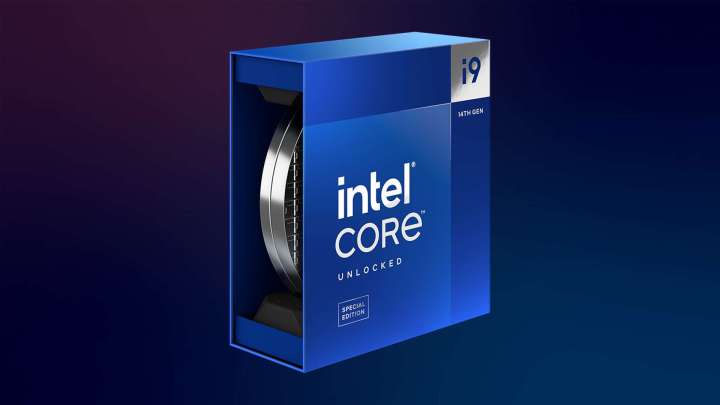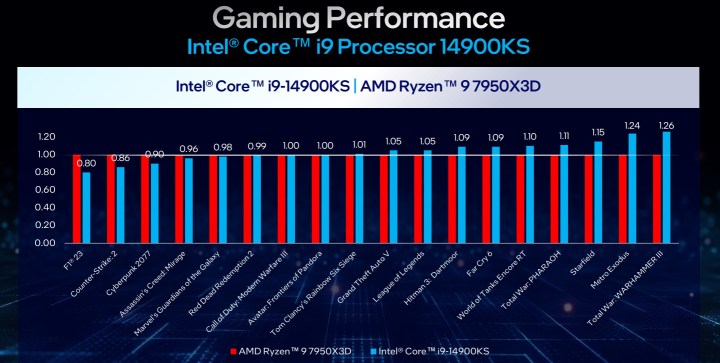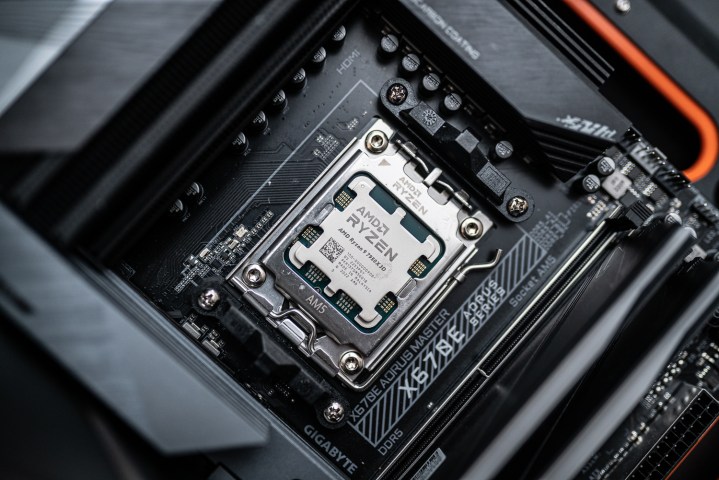Intel’s freshly released Core i9-14900KS processor is advertised as the fastest CPU in the world, but does that mean AMD can never hope to compete, even with its flagship Ryzen 9 7950X3D? Not at all. Each CPU has its merits, and both are insanely powerful in their own right. At this price point and at this performance level, making the right choice is tricky.
Let’s zoom in and find out how the Core i9-14900KS and the Ryzen 9 7950X3D stack up against each other, what they excel at, and which one is the better option to buy.
Pricing and availability

Intel’s Core i9-14900KS was announced on March 14, 2024, and it hit the shelves on that same day. It arrived as a follow-up to Intel’s Raptor Lake refresh, making it a successor not only to the Core i9-14900K, but mainly to the Core i9-13900KS. It only took Intel a few months to replace its previous flagship, seeing as the Core i9-14900K launched in October 2023. A cool halo product through and through, the KS version launched later than the rest of the lineup as a product aimed at enthusiasts who wouldn’t flinch at the $690 price tag.
Much like Intel took a bit of a breather before hitting the public with this monstrous CPU, AMD too took its time before the Ryzen 9 7950X3D, It arrived on the market later than the rest of the lineup — but it still launched much sooner than the entirety of the Raptor Lake refresh. While the Ryzen 7000 lineup launched in September 2022, the Ryzen 9 7950X3D followed months later on February 28, 2023, accompanied by the Ryzen 9 7900X3D. it was later followed by the world’s best gaming CPU — the Ryzen 7 7800X3D.
Believe it or not, AMD’s Ryzen 9 7950X3D actually managed to beat the eye-watering price tag of the Core i9-14900KS. At launch, the 3D V-Cache chip was priced at $700. However, following a steady series of price cuts, you can now score this beastly CPU at a much more agreeable price of $595.
While both CPUs are still expensive, it’s unlikely that Intel’s new offering will get any cheaper anytime soon, so this is as good as it’s going to get for the foreseeable future.
Specs
| Intel Core i9-14900KS | Ryzen 9 7950X3D | |
| Cores/threads | 24/32 (8 P-cores, 16 E-cores) | 16/32 |
| Base clock | 3.2GHz (P-cores), 2.4GHz (E-cores) | 4.2GHz |
| Boost clock | 6.2GHz (single core) | 5.7GHz |
| Cache (L2 + L3) | 68MB | 144MB |
| TDP | 150W (253W boost) | 120W |
| List price | $690 | $595 |
If you’re familiar with the chip architecture Intel has been employing since the Alder Lake generation, you know that on an architectural level, these two chips are vastly different. Intel’s Core i9-14900KS comes with a hybrid core architecture, which means that it offers a mix of performance (P) and efficiency (E) cores. However, this is nothing new at this point, and when you compare it to its predecessors, the core count has remained the same as in the Core i9-13900K, 13900KS, and 14900K. Meanwhile, AMD has far fewer cores at 16, but the same thread count.
The processors also differ in clock speed. Reviews of the Core i9-14900KS all agree that in terms of frequency, it’s as good as it gets for a consumer CPU. It maxes out at 6.2GHz, but it also already managed to beat a world record with an extreme overlock that broke past 9.1GHz. (This kind of performance can never be recreated in a home setting.) AMD’s top chip has a significantly higher base clock speed, but it maxes out at 5.7GHz in boost mode.
The two chips also vary greatly when it comes to combined cache size. The Core i9-14900KS offers 36MB of Intel Smart Cache (L3) and 32MB of L2 cache. AMD’s 7950X3D is impossible to beat in that regard, as it comes equipped with AMD’s proprietary 3D V-Cache, stacking up to 144MB.
And let’s not gloss over the difference in thermal design power (TDP) for both chips. While the Ryzen 9 7950X3D sits at 120 watts and won’t go much beyond that (3D V-Cache chips cannot be overclocked), Intel’s beastly Core i9-14900KS has a base TDP of 150 watts that goes up to 253W in turbo mode. However, for certain workloads, reviewers noticed that it can go even higher. It’s also more power-hungry than its predecessors.
Performance

As the Core i9-14900KS is still very new, reliable benchmarks are hard to come by, but we’ve tested the Ryzen 9 7950X3D extensively, so we can still compare the results and see how these two chips stack up against each other. Intel’s own prediction is that the Core i9-14900KS will be around 15% faster than the Core i9-13900KS, and in gaming, this sometimes checks out — but it’s not universal.
Intel provided us with some initial benchmarks of its own, comparing it to the Ryzen 9 7950X3D in gaming. In certain titles, AMD maintains an up to 20% lead, while in over half of the benchmarked games, the two CPUs are equal. The Intel chip scores a 26% win in Total War: Warhammer III and a 24% lead in Metro Exodus, though.

Based on our own benchmarks, pure gaming scenarios usually pan out much differently. For instance, in the comparison above, the Ryzen 9 7950X3D managed to hit 234 frames per second (fps) in Hitman 3 Dartmoor while the Core i9-14900K trailed behind with 224 fps. The Core i9-14900KS, being faster, will close the gap slightly, but it shouldn’t outperform the AMD processor. That’s the power of 3D V-Cache, which is also why the Ryzen 7 7800X3D does such a good job in gaming scenarios and actually beats the Core i9-14900KS in some benchmarks — despite costing nearly half the price.
According to benchmarks from Tom’s Hardware, the Ryzen 9 7950X3D was slightly slower than its cheaper counterpart, reaching 193 fps on average compared to the 200 fps achieved by the 7800X3D. On the other hand, the Core i9-14900KS averaged 188 fps at 1080p when using DDR5-6800 memory, and only 176 fps without the high-end RAM. This narrative continues at 1440p. Although the frame rates are lower across the board, the 7800X3D wins, closely followed by the Ryzen 9 7950X3D, with the Core i9-14900KS falling behind.
However, most users won’t be buying the Core i9-14900KS for its gaming capabilities. Its true strength lies in productivity tasks, and this is where it shines, all thanks to the enormous core count and ultra-high frequency. Intel CPUs typically handle productivity better than AMDs’, and with such a wide gap in core counts, it’s bound to take the lead. This CPU is also said to handle single-core workloads with ease — again, this comes down to its high clock speed.
In fact, a review from HotHardware suggests that HEDT chips and the Core i9-14900KS are on an even playing ground, with the new CPU actually winning the duel at times. The Core i9-14900KS fell slightly behind the Ryzen 9 7950X in Tom’s Hardware’s multi-threaded performance ranking, but it was quite far ahead of the X3D chip, not to mention miles and miles ahead in single-threaded workloads.
As for how the Core i9-14900KS compares to the Core i9-14900K, it should come as no surprise that the two chips are very similar. Intel decked out the Core i9-14900KS with extended Application Optimization (APO), which is nice enough, but aside from a higher power draw and even faster clock speeds, the Core i9-14900K and its KS sibling are nearly identical.
No contest

The never-ending question of AMD vs. Intel strikes back. Which of these two processors is better? There’s no straightforward answer to that question — everything depends on your use cases — and yet, we still have a clear winner.
Intel’s Core i9-14900KS is the fastest consumer CPU for productivity workloads right now, but it’s no slouch in gaming, either. It’ll breeze through just about every title at 1080p, but most people won’t be buying a $700 CPU to play at 1080p. At higher resolutions, the GPU takes over the heavyweight tasks, which is why this processor will usually end up in builds that are also decked out with one of the best graphics cards. In pure gaming scenarios, you’ll never need all the power this processor can provide.
AMD’s Ryzen 9 7950X3D, on the other hand, may fall behind in productivity. It has much fewer cores and it can’t hope to ever hit that magical 6.2GHz mark. However, alongside its cheaper sibling, the X3D part is still among the fastest processors for gaming, and it trumps the Core i9-14900KS while consuming far less power. It also costs $100 less on average, which isn’t as much of a problem at this price range, but it proves which processor provides better value.
It’s worth noting that AMD also wins in terms of future-proofing. If you buy the Core i9-14900KS now, you’ll need to swap out your entire chipset for future upgrades, as Intel is moving on to a new socket in Arrow Lake. AMD is committed to sticking to its new AM5 platform for a few years.
If you need the Core i9-14900KS for productivity tasks, it’s worth its weight in gold and then some. However, if you just want an enthusiast-level processor that won’t even blink no matter what you throw at it, the AMD Ryzen 9 7950X3D is a better option to buy in most cases. It’s cheaper, more efficient in terms of power consumption, still a productivity workhorse, and the (nearly) undisputed gaming king. For pure gaming scenarios, just get the Ryzen 7 7800X3D.
Editors' Recommendations
- Intel just launched the ‘world’s fastest’ CPU
- Intel may have a monster new CPU coming soon
- The iPhone 15’s chip challenges Intel’s fastest desktop CPU — but there’s a catch
- AMD’s latest V-Cache chip proves to be cheap, fast, and perfect for gaming
- AMD’s upcoming Ryzen 5 5600X3D could completely dethrone Intel in budget builds




